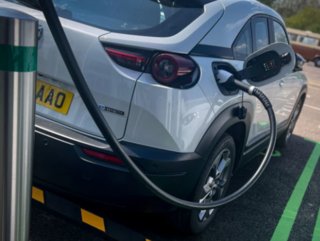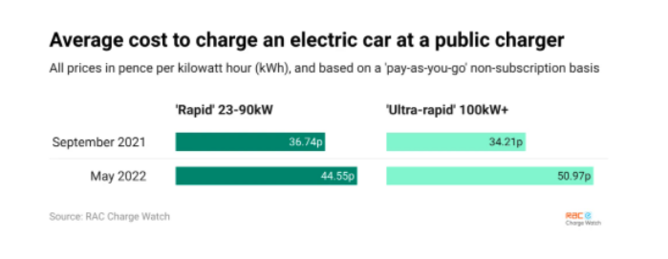UK electric charging costs jump £4 due to energy crunch

The average price of charging an electric car on a pay-as-you go, non-subscription basis at a publicly accessible rapid charger in the UK has increased by 21% to 44.55p per kWh since September, figures analysed by the RAC’s new Charge Watch initiative in association with the national FairCharge campaign show.
The 7.81p per kWh increase, from 36.74p at the end of last summer, means that the average cost to complete an 80% rapid charge of a typical family-sized electric car with a 64kWh battery has increased by £4 over this period, from £18.81 to £22.81 now (cars revert to slower charging speeds beyond 80% to preserve battery health).
In stark contrast, the cost of filling a 55-litre family car from empty to 80% has increased by £14.54 since last September, from £59.67 to £74.21.
The RAC’s analysis shows that it now costs on average 10p per mile to charge at a rapid charger, up from 8p per mile last September. This is nearly half the cost per mile compared to filling a petrol-powered family car, the cost of which has risen from 15p per mile since the end of last September to a staggering 19p per mile now. The cost per mile for a similarly sized diesel-powered car is even higher at nearly 21p.
The average price of charging at the quickest ultra-rapid chargers – which have a power output of 100kW-plus and can deliver a charge to a compatible vehicle in as little as 20 minutes – has increased by a greater margin of 16.76p per kWh, from 34.21p per kWh in September to 50.97p in May.
This means the cost to charge a vehicle to 80% has risen from £17.51 to £26.10. This, however, is still £48 cheaper than filling a petrol-powered car to 80%, although electric car drivers do not get quite as many miles from an 80% charge as drivers of petrol cars do from an equivalent fill-up of a tank.

The price increases facing drivers of electric cars using publicly accessible chargers can be explained by the rises in the wholesale cost of electricity, which itself is driven by hikes in the cost of gas – especially since a considerable proportion of the UK’s electricity is generated by natural gas-fired power stations.
Ofgem figures show that the wholesale cost of gas doubled between the end of September 2021 and the end of March this year, with wholesale electricity prices rising by around 65% over the same period.
While the cost of charging a zero-emission electric car remains good value compared to topping up a petrol or diesel car, as things stand drivers who can’t charge up at home – which could be as many as one-in-three – are penalised by having to pay a higher rate of VAT on electricity than those who can, something the RAC-backed FairCharge campaign consistently points out. This risks putting off a huge number of drivers from switching to electric next time they change their vehicles.
The FairCharge campaign is therefore calling for the 20% VAT rate currently charged on electricity at public chargers to be cut to match the 5% levied on domestic electricity, thus making it an easier decision for those who cannot charge at home to switch to an electric car.
Doing so would see the cost of charging up at a rapid charger cut by 5.57p per kWh, and at an ultra-rapid charger by 6.37p. This would reduce the cost of an 80% charge by £2.85 and £3.26 on average at rapid and ultra-rapid chargers, respectively.
RAC electric vehicle spokesperson Simon Williams said just as the price that drivers of petrol and diesel cars pay to fill up at the pumps is driven by fluctuations in the world oil price, those in electric cars are affected by gas and electricity prices.
"But while electric car drivers may not be immune from the rocketing price of wholesale energy – most notably gas, which in turn dictates the cost of electricity – there’s no doubting that charging an EV still represents excellent value for money compared to filling up a petrol or diesel car," he said.
“Unsurprisingly, our analysis shows that the quickest places to charge are also the most expensive with ultra-rapid chargers costing on average 14% more to use than rapid chargers. For drivers in a hurry though, or travelling a long distance, paying this premium might well be worth it with the very fastest chargers capable of almost completely replenishing an electric car’s battery in a matter of minutes."
Charging from home is 'most affordable' option
He added the most affordable way of charging an electric car isn’t at a public charger – it’s from home, where overnight electricity rates can be much lower than their public charger counterparts.
"Our own RAC Recharge tariff, for instance, costs just 12p per kWh overnight. But for people who have no option of charging up at home, there is no opportunity to benefit from these sorts of savings," he said.
The other reason home charging can be so much cheaper is because of the "bizarre way" that electricity is taxed.
"Right now, VAT on electricity from a public charger is levied at a rate four-times that which applies to domestic electricity which makes it far more expensive to charge on-the-go than it should be. We are right behind the FairCharge campaign in thinking this is totally unfair and flies in the face of the Government’s ambition for many more drivers to opt for an electric vehicle."
“Given the cost-of-living crisis, it’s surely only fair that everyone pays the same level of VAT no matter where they buy their electricity from."
Quentin Willson, founder of the FairCharge campaign, said keeping a watch on charging prices is essential to make sure the electricity for charging up EVs never gets close to the cost of filling up with diesel. EV drivers need free to access data on charging prices across the country. "And charging operators need to know that everybody is watching," he said.
Williams said launching RAC Charge Watch, complementing its RAC Fuel Watch, gives greater clarity to drivers about what they can expect to pay to charge on public networks.
"We’re the only major national breakdown service to have patrol vans that can give a flat or severely depleted electric car an emergency boost, and we also offer home charger installation and our own dedicated electricity tariff, giving cheaper overnight charging for drivers who have their own driveways," he said.
"This is all on top of comprehensive advice on all things electric vehicles that we provide free-of-charge on our website, including valuable myth-busting guides."
Angela Hultberg, Global Sustainability Director at Kearney, said the cost of UK public charging points rising 21% in the last nine months will raise eyebrows, but ultimately this is still a smaller rise than we’ve seen from the cost of petrol and diesel over the same period.
"Electric vehicles are still far more cost-effective, and more competitive, compared to their fossil fuel-dependent peers," she said.
“For a UK government striving for greater public uptake in non-polluting vehicles in the name of achieving our net-zero ambitions, now is the time to support sustainable transport options through investing in a reliable and affordable charging infrastructure. It is only when the sustainable options are also the most affordable and convenient modes of transport, that we’ll see mass adoption.”






